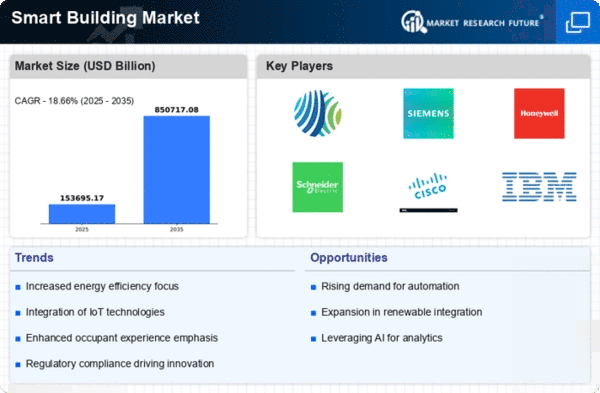Top Industry Leaders in the Smart Building Market

*Disclaimer: List of key companies in no particular order
The Competitive Landscape of the Smart Building Market
The global smart building market is a dynamic arena buzzing with established giants, agile startups, and innovative solutions. Understanding this complex landscape is crucial for navigating its twists and turns. This analysis delves into the key players, their strategies, and the factors influencing market share, providing a comprehensive picture of the current scenario.
The smart building market is characterized by intense competition, with players constantly vying for market share. Differentiation through innovation, strategic partnerships, and customized solutions is key to success. While established players retain an edge due to their resources and brand recognition, agile startups and specialized vendors are presenting formidable challenges with their disruptive technologies and niche expertise. The market is further fueled by emerging trends like AI, sustainability, and user experience, continuously reshaping the landscape and creating new opportunities for players willing to adapt and evolve.
Some of the Smart Building companies listed below:
- Legrand
- Honeywell International Inc.
- Nexii Building Solutions Inc.
- Cylon Controls
- ABB Ltd.
- Johnson Controls
- Smart Nation
- Siemens AG
- Cisco Systems Inc.
- IBM Corporation
- Hitachi Ltd.
- Endeavor Business Media
- Softdel System
- KMC Controls
Strategies Adopted by Key Players:
- Product Diversification: Expanding their offerings beyond traditional building management systems (BMS) to include connected lighting, HVAC automation, energy management systems, and security solutions.
- Open Platforms and Partnerships: Integrating their systems with third-party solutions and platforms to provide greater flexibility and choice for customers.
- Cloud-Based Services: Leveraging the cloud to offer data analytics, remote monitoring, and predictive maintenance capabilities.
- Vertical Market Focus: Tailoring solutions to specific sectors like healthcare, hospitality, offices, and retail to address unique needs.
- Specialization: Focusing on specific aspects of smart buildings, like smart thermostats, lighting control, or home automation systems.
- Direct-to-Consumer Sales: Bypassing traditional distribution channels to reach customers directly and build brand loyalty.
- Mobile App Integration: Developing intuitive mobile apps for seamless control and monitoring of smart systems.
- Focus on Affordability: Offering cost-effective solutions to make smart building technology accessible to a wider audience.
Factors for Market Share Analysis:
-
Product Portfolio Breadth and Depth: Offering a comprehensive range of solutions across various building automation and management systems holds a significant advantage. -
Geographical Footprint and Market Penetration: Presence in key regions and established relationships with local players are crucial for gaining market share. -
Technology Innovation and Leadership: Continuous investment in R&D, adopting cutting-edge technologies like AI and machine learning, and developing secure and interoperable platforms differentiate successful players. -
Partnerships and Ecosystem Collaboration: Building strong partnerships with technology providers, service providers, and industry stakeholders creates a robust ecosystem and expands reach. -
Pricing Strategy and Customer Service: Competitive pricing models, tailored solutions, and excellent customer service attract and retain clients in a price-sensitive market.
New and Emerging Trends:
-
Artificial Intelligence (AI) and Machine Learning (ML): AI-powered building optimization, predictive maintenance, and personalized occupant comfort are paving the way for next-generation smart buildings. -
Cybersecurity and Data Privacy: With increasing connectivity comes heightened risk. Secure platforms, robust data encryption, and adherence to privacy regulations are becoming critical differentiators. -
Sustainability and Energy Efficiency: Integration of renewable energy sources, smart grids, and intelligent energy management systems are in high demand, driving eco-friendly building solutions. -
Personalization and User Experience: User-centric systems, voice-activated interfaces, and occupant-aware automation are creating more comfortable and responsive buildings. -
Integration with Building Information Modeling (BIM): BIM provides a digital model of the building, enabling data-driven design, construction, and operation, creating a seamless connection between the physical and digital worlds.
Latest Company Updates:
On Sep.21, 2023- Kyndryl, a leading global IT infrastructure services provider, announced Kyndryl Japan's support to Taisei Corporation in its smart building transformation business through developing and managing its public cloud environment. Kyndryl has supported the development and management of the company's building platform, LifeCycleOS, bringing together BIM and IoT.
On Aug. 01, 2023- Senet, Inc., a leading cloud-based software & services platforms provider, announced a partnership with ProSentry, a leading all-in-one wireless monitoring solution provider, to deliver smart building solutions. These companies would use Senet's PaaS platform to deploy and manage private LoRaWAN networks and smart building sensors. Using LoRaWAN to manage building management solutions helps reduce insurance premiums & repair costs and improve tenant satisfaction while saving time and mitigating risks.
On May 25, 2023- Honeywell announced the release of its Cybersecurity Smart Building Tools. The company's software and hardware tools series, including an operational technology (OT) cybersecurity tool and a smart building management system, are designed to improve sustainability and efficiency. Honeywell's new cybersecurity tool, Cyber Insights, collects information from multiple OT data sources to identify vulnerabilities and threats.
On July 11, 2023- Siemens announced that Industry analyst firm Verdantix has recognized Siemens Smart Infrastructure as a leader in integrated smart building security software. The software is part of the Siemens Xcelerator portfolio for smart buildings security. The assessed Siemens software, Siemens Xcelerator, is an open digital platform enabling customers to accelerate their digital transformation. Verdantix acknowledged that Siemens solutions offer highly advanced unified security management capabilities.









